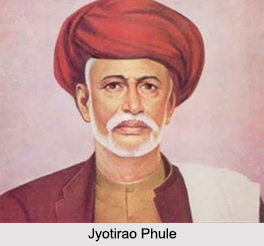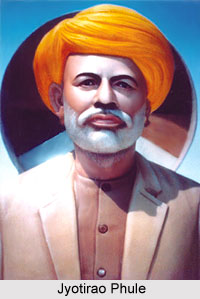Jyotirao Phule;s contribution in Education
 Contribution of Jyotirao Phule on education led to development of the society as a whole. Like Syed Ahmad Khan and Ram Mohan Roy, he saw access to modern education as crucial to the advancement of his people, who were the peasant masses of western India. Jyotirao Phule had the feeling rather a strong feeling that the society could not progress and prosper without the proper spread of education, especially among women.
Contribution of Jyotirao Phule on education led to development of the society as a whole. Like Syed Ahmad Khan and Ram Mohan Roy, he saw access to modern education as crucial to the advancement of his people, who were the peasant masses of western India. Jyotirao Phule had the feeling rather a strong feeling that the society could not progress and prosper without the proper spread of education, especially among women.
Jyotirao Phule"s quest for providing women and girls with right to education was supported by his wife Savitribai Phule. In 1851, Jyotiba established a girls" school at Bhide for untouchable girls and asked his wife to teach the girls in the school. Local upper-caste people objected to it, and he was asked to close the school, and quit the locality. He left the place, but soon he restarted the work after raising funds from prominent Europeans and Indians. Later, he opened two more schools for the girls and an indigenous school for the lower castes, especially for the Mahars and Mangs. Girls from different religions, castes and socio-economic background would come to study. However, the school was temporarily closed due to shortage of funds.
In 1854, Jyotirao Phule opened the first native library for low-caste students. In 1855, he started a night school at his house. After consistent efforts finally the government decided to provide ample fund for the purpose of education of the masses. In 1857, the Government allotted him a plot to set up a school.
Jyotirao Phule realised the pathetic conditions of widows and established an ashram for young widows and eventually became advocate of the idea of Widow Remarriage. Around his time, society was patriarchal and the position of women was terrible. Female infanticide was a common occurrence and so was child marriage, with children sometimes being married to men much older. These women often became widows before they even hit puberty and were left without any family support. Jyotirao was pained by their plight and established an orphanage in 1860 to shelter these unfortunate souls from perishing at the society"s cruel hands.
Jyotirao Phule was in favour of Western education and demanded free and compulsory primary education up to the age of 12. Jyotirao Phule advocated technical education for the lower classes. He also wanted education to be imparted to the children in rural areas.
Jyotirao felt that the objective to patronize education would prepare scholars who, it is thought, would in time vend learning without money and without price.
Contribution of Jyotirao Phule to Primary Education
 Jyotirao Phule on Primary Education has done a great deal of good towards promoting the concept of education among the people. With regard to the few Government primary schools that exist in the Presidency, Phule observed that the primary education imparted in them is not at all placed on a satisfactory or sound basis. The system was imperfect and did not prove practical and useful in the future career of the pupils. However, it had the capability of being developed up to the requirement of the community, if improvements that will result in its future usefulness were effected in it.
Jyotirao Phule on Primary Education has done a great deal of good towards promoting the concept of education among the people. With regard to the few Government primary schools that exist in the Presidency, Phule observed that the primary education imparted in them is not at all placed on a satisfactory or sound basis. The system was imperfect and did not prove practical and useful in the future career of the pupils. However, it had the capability of being developed up to the requirement of the community, if improvements that will result in its future usefulness were effected in it.
Phule felt that both the teaching machinery employed and the course of instruction now followed, required a thorough remodelling. Thus he laid a thorough list of what he thought required to be done in order to improve the condition of primary education.
1. He felt that teachers employed were mostly Brahmins; a few of them are from the normal training college, the rest being all untrained men. They were paid low salaries. He felt that the teachers of the primary schools must be properly trained. And they should also be able to mix with students freely, and understand their wants and desires. The course of training for them ought to include, besides the ordinary subjects, an elementary knowledge of agriculture and sanitation. The untrained teachers should, except when thoroughly efficient, be replaced by efficient trained teachers.
2. He formulated the course of study and said it should consist of reading, writing and accounts, and a rudimentary knowledge of general history, general geography, and grammar, also an elementary knowledge of agriculture and a few lessons on moral duties and sanitation.
3. Phule felt that the system of supervising agency over these primary schools was also very defective and insufficient, and that according to him, needed to be upgraded.
4. He also felt that the number of primary schools were much less and should be increased;
a) By utilizing such of the indigenous schools as shall be or are conducted by trained and certificated teachers, by giving them liberal grants-in-aid.
b) By making over one half of the local cess fund for primary education alone.
c) By compelling, under a statutory enactment, municipalities to maintain all the primary schools within their respective limits.
d) By an adequate grant from the provincial or imperial funds.
Contribution of Jyotirao Phule to Higher Education
Jyotirao Phule contributed immensely to the aspects of higher educations in India. The cry of the entire country has been to provide ample support to the higher education. To some extent this cry is justified, although the classes directly benefited by the higher education may not readily admit it.
It was unanimously decided that the people of the country must get the get a better system of education; hence it was thought that government should make moves to provide better facilities of education. It was largely perceived that education in India was still in its infancy, and any withdrawal of State aid from higher education could but be injurious to the spread of education generally.
A taste of education among the higher and wealthy classes, such as the Brahmins and Purbhoos, especially those classes who lived by the pen, had been created, and a gradual withdrawal of State aid was possible so far as these classes were concerned; but in the middle and lower classes, among whom higher education has made no perceptible progress, such a withdrawal would be a great hardship.
He believed that in case of such withdrawal, boys will be obliged to have recourse to inefficient and sectarian schools, much against their wish, and the cause of education cannot but suffer. Nor could any part of such education be entrusted to private agency. For a long time to come, he felt, the entire educational machinery, both ministerial and executive, must be in the hands of Government.
Both the higher and primary education required all the fostering care and attention which Government can bestow on it. The withdrawal of Government from schools or colleges would not only tend to check the spread of education, but would have seriously endangered that spirit of neutrality that has all along been the aim of Government to foster, owing to the different nationalities and religious creeds prevalent in India.
Withdrawal might, to a certain extent, created a spirit of self-reliance for local purposes in the higher and wealthy classes. With regard to the question as to educated natives finding remunerative employments, Phule felt that the educated natives who mostly belong to the Brahminical and other higher classes were mostly fond of service.




















